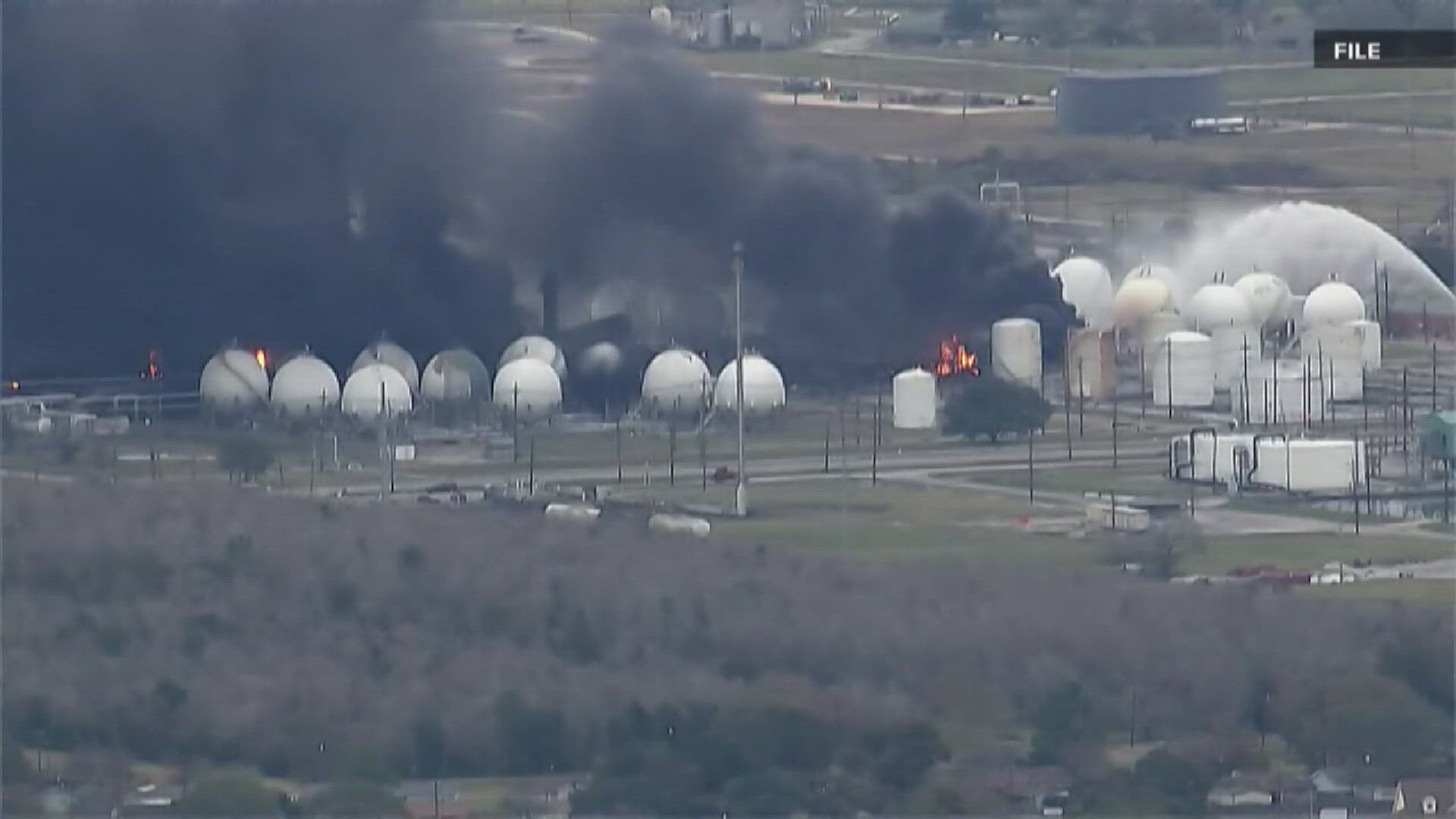BEAUMONT, Texas — TPC has plead guilty to in a federal criminal investigation into the November 2019 explosion at the company's Port Neches plant.
Representatives of the TPC Group appeared in Federal Court Tuesday afternoon to plead guilty to a Clean Air Act violation.
According to a press release, TPC Group entered a plea of guilty today to a one-count information charging the company with a violation of the Clean Air Act before U.S. Magistrate Judge Zack Hawthorn for the Eastern District of Texas.
The filings address explosions that caused injuries, evacuations and significant air pollution.
The company has agreed to pay over $30 million in criminal fines and civil penalties and spend approximately $80 million to improve its risk management program and improve safety issues at TPC Group’s Port Neches and Houston facilities.
The company has agreed to pay $18 million in criminal fines. The plea agreement also includes a one-year term of probation and the publishing of a public apology.
The $12.1 million in civil penalty payments will be made through bankruptcy proceedings.
The civil complaint includes 27 claims and counts against TPC for violations of the Clean Air Act at its Port Neches facility, including numerous violations that led to the 2019 explosions, according to the release.
The Port Neches facility is now used for storage purposes only.
The civil complaint also includes 26 claims and counts against TPC for Clean Air Act violations at the company’s Houston facility, including failing to promptly take corrective actions for hundreds of pieces of process equipment as well as failing to address similar conditions that led to the Port Neches explosions.
"Under the proposed civil consent decree, TPC Group is required to update safety information for equipment at its Port Neches and Houston facilities to ensure that they are designed, maintained, inspected and operated in a safe manner. TPC Group must overhaul its process hazard analysis program to ensure prompt completion of all corrective actions and remedial measures to mitigate hazards at the facilities. TPC Group will also update operating procedures and training for its workers and contractors. TPC Group has agreed to audit and revise their emergency shutdown procedures and implement key performance indicators," the release states.
The company will now give incident investigations to EPA and release incident report information to the public on a public website. TPC will also install and use air monitors at the fence line of each facility and in the neighboring communities. Data from the air monitors will be available on TPC Group’s website, according to the release.
Many Southeast Texans will remember the explosion that shook homes miles away when the TPC plant exploded the day before Thanksgiving on Nov. 27, 2019.
According to information in court, two explosions at TPC Group’s Port Neches facility caused evacuations of thousands of residents from Port Neches and some surrounding areas. More than 11 million pounds of extremely hazardous substances were released and it caused more than $130 million in offsite property damage. The explosions also caused other impacts to human health and the environment.
Four employees and one contractor suffered injuries including concussions, burns, perforated eardrums, tinnitus and cracked teeth, according to an EPA news release.
In August 2023 the U.S. Department of Justice launched a criminal investigation into the explosion which caused more than $153 million in damages to hundreds of homes and businesses.
A report from the U.S. Chemical Safety Board, in December 2022, blamed the explosion on "a known safety hazard – popcorn polymer – that was poorly managed and controlled at the facility."
The TPC facility produced the hazardous chemical butadiene, which is used in the production of tires, latexes and plastics. Butadiene can form a “popcorn polymer,” which can grow at an accelerating rate and cause catastrophic events, including explosions and fires, according to the EPA release.
"Under the Clean Air Act the release of butadiene, which of course is a toxin, was released. Which resulted in the 4 mile radius of evacuations and exclusion of people from the area," said Marks Sparks, the Ferguson Law Firm attorney who is representing hundreds of people who have filed civil lawsuits against TPC.
The company failed "to implement its own written procedures requiring the injection of DEHA popcorn polymer inhibitor into the line connecting pump S4G7 to tower S4D4 when the pump was removed from service and/or the monthly flushing of the pump" according to the court documents.
TPC filed for bankruptcy in Delaware in 2021 and reached a $30 million bankruptcy settlement in 2023.
On the fourth anniversary of the explosion in 2023, thousands were still waiting on claims to be paid and lawsuits to move forward according to file stories.
At the time a court appointed trustee in the TPC bankruptcy had received all the claims against the settlement according to Sparks.
"Thousands of claims were filed and TPC choose to underinsure itself for its victims, so it didn't have enough insurance and ultimately filed for bankruptcy," Sparks told 12News in November 2023.
At that time Sparks estimated that payouts from the bankruptcy might happen in late 2024.
"TPC Group sincerely regrets the damage and disruption caused by the November 2019 incident...since the event TPC Group has cooperated fully with all federal, state and local investigations," the company said in a statement.
GET NEWS & WEATHER ALERTS | Download the 12News App to your mobile device
This is a developing story. We will update with more if and when we receive more confirmed information.

